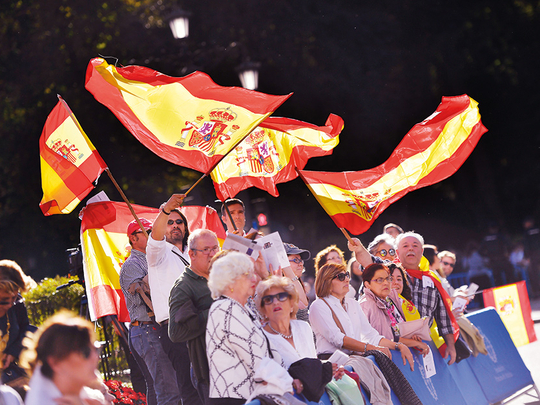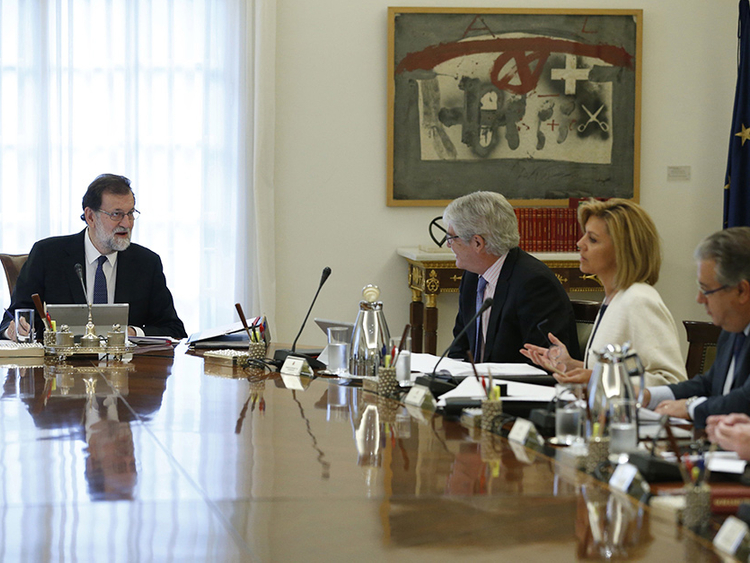
Madrid: In an unexpectedly forceful attempt to stop Catalan secessionism in its tracks, Prime Minister Mariano Rajoy of Spain announced on Saturday that he would begin the process of removing the region’s separatist leader, Carles Puigdemont, from office.
After calling an emergency meeting of the Spanish Cabinet, Rajoy announced the process to begin taking back control of the independence-minded region by invoking Article 155 of the Spanish constitution — a broad tool that has been threatened once before but never used.
Rajoy said the Catalan government never offered real dialogue with the central government in Madrid but instead tried to impose its secessionist project in violation of Spain’s constitution. He said his government was putting an end to “a unilateral process, contrary to the law and searching for confrontation” because “no government of any democratic country can accept that the law be violated, ignored and changed.”
Rajoy added, “What I have faced is something that I have never confronted in my many years in politics, but I didn’t choose my interlocutor.”
Ministries in Madrid will take over the management of the Catalan administration, including the regional police force and its public television and radio channels, while the prime minister will have the power to dissolve the regional legislature. Rajoy said he aims to trigger fresh elections within six months.
“We are going to work to return to normality,” Rajoy said at a news conference in Madrid after a cabinet meeting. “We are going to work so that all Catalans can feel united and participate in a common project in Europe and the world that has been known for centuries as Spain.”
The decisions must be ratified by a vote in the Senate, potentially within a week.
The decision brings the Catalan crisis to a new intensity, as the prime minister seeks to put down an unprecedented constitutional rebellion with untested legal weaponry. While Rajoy has the law, most of the country and ultimately the army at his back, the Catalan separatists are counting on widespread support from regional officials and an extensive network of activists who’ve drawn up plans for guerrilla action against foreign companies and critical infrastructure.
Catalan institutions have flouted the authority of the Spanish state since legislating for a referendum on independence on September 6. Despite a series of rulings from the courts, regional officials went ahead with that vote amid a violent police crackdown, waving away complaints about widespread irregularities to declare victory.
Separatist leaders in the Catalan parliament will meet on Monday to discuss a date for a unilateral declaration of independence, according to a person familiar with their plans. “This is a serious attack on the rights and freedoms of all people, here and everywhere,” Barcelona Mayor Ada Colau, who backs the Catalans right to vote, but hasn’t called for independence, said on Twitter.
Rajoy’s decision is a watershed moment for Spain and its 1.1 trillion euro ($1.3 trillion, Dh4.7 trillion) economy, which counts on Catalonia for a fifth of its output. Hundreds of companies have already set up headquarters elsewhere in the country to avoid the developing legal limbo and the government has cut its growth forecast for next year, citing the disruption in Catalonia.
“Rajoy is showing the Catalans that the intervention has a clear time limit,” said Narciso Michavila, the chairman of polling company GAD3, which has done consultancy work for Rajoy’s People’s Party. “He is clearing up some people’s concerns about a long-term intervention.” Rajoy thanked two opposition parties, the Socialists and Ciudadanos, for their support for the measures. Between them, those groups have 250 out of the 350 seats in the national parliament. Rajoy said there’s no way now that the measures can be halted, unless the Senate votes against them.
Rajoy said he wanted no more companies to take their registered offices out of Catalonia or for savers to take their savings from banks in the region. Major Barcelona-based companies including CaixaBank SA and Gas Natural SDG SA have moved their legal base out of the region because of the political uncertainty.
The independence struggle has thrust Catalonia onto the world stage, casting the regional capital Barcelona in a fresh and dramatic light. Spain’s second-biggest city, a tourist hub and a major port on the Mediterranean, has been filled with hundreds of thousands of demonstrators, and thousands of police, at key moments in the battle.
Messi shows where his heart lies
Barcelona’s Argentine legend Lionel Messi entered the highly-charged drive by Catalonia for independence on Friday when he posted a video on social media of his child singing in Catalan.
The clip on Instagram shows Messi’s two-year-old son Mateo singing a nursery rhyme in the regional language.
Among the flood of comments triggered by the post was one from Messi’s teammate, Gerard Pique. In his comment to Messi’s Instagram video Pique replied: “In Catalonia they never stop indoctrinating children with ‘Jean Petit qui danse’..... [the title of the nursery rhyme]” in a sarcastic dig at those in Spain who accuse Catalan authorities of indoctrination in schools. His tongue-in-cheek blast was topical as it came after the Madrid government on Tuesday rejected an attempt to beef up school inspections to stamp out the alleged indoctrination of children.
Central defender Pique has never publicly backed independence, but has been an outspoken campaigner for a referendum on the issue. His participation in the October 1 independence referendum deemed constitutionally illegal by Madrid has seen some fans call for the veteran Spanish international to stop playing for his country.
Pique and other leading members of Spain’s 2010 World Cup-winning team have urged dialogue between political leaders on both sides of the divide to avoid a repeat of the violent scenes triggered by the independence referendum.












